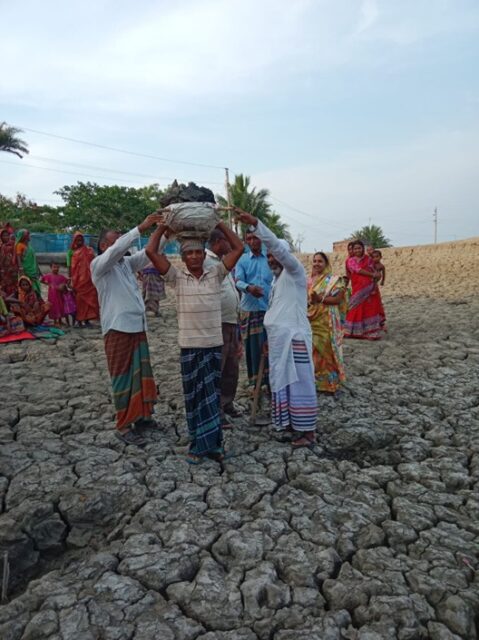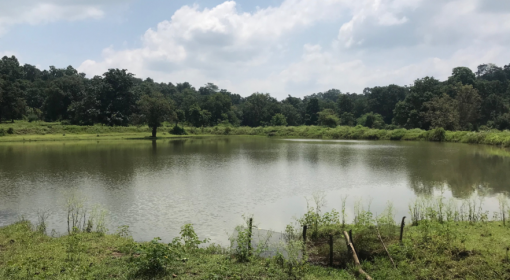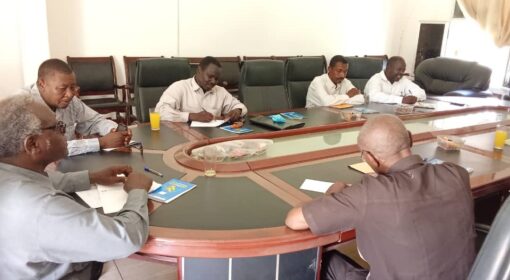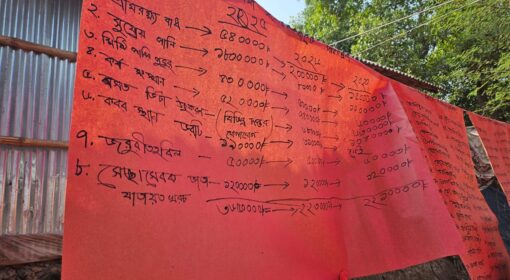by Md. Mehedi Hasan Shuvo (Uttaran) and Mst.Jannatul Naim
This blog is part of a dossier on locally-led adaptation, featuring insights and lessons from the Reversing the Flow (RtF) program. RtF empowers communities in Bangladesh, Burkina Faso, Ethiopia, Kenya, and Sudan to build climate resilience through direct funding and a community-driven, landscape approach.
North Puijala, a small village in Sreeula Union of Assasuni Upazila, Satkhira, Bangladesh is one of the most climate-affected areas in the southern region. The community (96 households) faces a yearly struggle with water scarcity, especially during the dry season.
The lack of safe water for bathing, cooking, and washing leads to serious health issues like skin diseases and stomach problems. Women and girls, who are mostly responsible for collecting water, suffer the most.
In 2025, the people of North Puijala took matters into their own hands. During the inception phase of the Reversing the Flow program in 2024, the community formed a new Landscape Management Committee and actively participated in their own baseline assessment. With facilitation from the Uttaran Hub, they identified their community priorities based on local landscape challenges. Selected committee members actively participated in their own baseline assessment, identifying local needs and priorities. While the community took the lead in driving the process, the hub’s role was focused on facilitation and providing capacity development support as needed. The community expressed a demand for support in areas such as financial literacy and fund management for landscape restoration initiatives, which led to the organization of a tailored workshop. Through this hub-supported approach, the community not only gained the skills to manage significant budgets with greater confidence but also learned how to document, share, and collaborate effectively with multiple stakeholders, a model that was new to the area.

That same year, the community received a regrant from the Reversing the Flow program. As part of a broader landscape resilience effort, they launched a their own project to re-excavate a dried-up pond, aiming to capture and store rainwater during the monsoon. The goal was simple yet essential: to ensure sufficient water for household use during the dry season. The community decided to invest BDT 2,070,000 (around 15.000 euros) of the regrant for this initiative.
The official work began on May 7, 2025, with the presence of local Chairman of Union Complex (local government representative), but the drive and action came fully from the people themselves.
The pond is located on land owned by Mr. Aprbo Kumar Shaha, who is also the president of this Puijala landscape management committee under RtF program. A 10-year agreement was made between him and the community to use the pond water. The agreement also included thoughtful, sustainable clauses: community access to water, tree planting for shade, pesticide-free vegetable gardening around the pond, and a yearly contribution of Tk.1000 from the pond’s income (from fish culture and pond side vegetable gardening) to the committee’s joint account. The project is being closely monitored by a three-member group selected from the Landscape Management Committee, reflecting their strong sense of responsibility and ownership. This group oversees day-to-day activities, including labor contracts, quality assurance through the engagement of seven skilled workers from outside the community, and coordination with local laborers from within the village. They also handle urgent decision-making in consultation with the full Landscape Management Committee. All decisions and observations are carefully documented in the committee’s resolution book and regularly shared with the broader community through open courtyard discussions, ensuring transparency and collective participation.
Overcoming challenges through community-led decision making
A key moment in this story came when the community faced an unexpected challenge. They had planned to use an excavator machine to speed up the digging work. But due to the narrow and muddy road, the machine got stuck and could not continue. Instead of giving up or waiting for outside help, the community quickly organized an emergency meeting. During the meeting, they decided to switch to manual excavation. This change turned a problem into an opportunity by creating local employment.

Now, 44 community members 36 men and 5 women are working as labourers to dig the pond with their own hands. They agreed on a daily wage of Tk. 350, which is fair and reasonable based on the local rate, set by the community as a fair rate for what they saw as their own work, not a commercial project.Considering the extreme summer heat, working hours were set from 6:30 AM to 12:30 PM. This change was especially helpful for women, allowing them to earn income while still managing their household duties.

This locally led initiative has become a true example of resilience and smart adaptation. The way the community monitored, reflected, and adjusted their plan in real-time shows how powerful collective action can be. Their hands not only dug a pond but also dug a path to improved health, reduced hardship, and long-term water security. North Puijala’s story is proof that even in the face of challenges, solutions can grow from the ground up.
Key takeaways from North Puijala:
In many traditional development projects across Bangladesh, key decisions such as budgeting, planning, and technology selection are typically controlled by external actors like donors, NGOs, or government agencies. Communities often have little or no influence over how funds are used, with limited access to financial records or project plans. This top-down model frequently leads to mismatches between project interventions and actual local needs, reducing community ownership and long-term sustainability. In contrast, the RtF approach piloted in North Puijala represents a shift towards genuine community-led development. From the outset, the community was actively involved in identifying priorities, managing a substantial regrant, and selecting appropriate technologies and methods. A local Landscape Management Committee was formed, trained in financial literacy, and empowered to oversee every aspect of the project from daily operations to transparent budget tracking. Even when challenges arose, such as the failed use of an excavator, the community adapted their plan through collective decision-making and chose manual excavation, which generated local employment. This level of participation, ownership, and adaptive management is rarely seen in conventional projects.
The RtF approach not only ensured the technical success of the pond restoration but also built local resilience, accountability, and long-term trust highlighting a model that could significantly enhance the effectiveness of future development efforts in Bangladesh.
| Traditional vs. RtF Community-Led Approach | ||
| Common System Practice | Community-Led Approach (North Puijala) | |
| Budget Control & Use | Budgets are controlled by donors or implementing agencies. Communities have little say or visibility over spending | The community manages and tracks budgets openly. Financial decisions are made collectively, promoting accountability. |
| Decision-Making | Key project decisions are made externally, with minimal community input. | All major decisions—from site selection to implementation- are made by the community through participatory processes. |
| Technology & Methods | Solutions are often pre-determined by outsiders and may not suit local conditions. | Technology and methods are chosen based on local needs and realities (e.g., manual digging instead of excavator use) |
| Ownership & Management | Responsibility stays with NGOs or government; communities are passive participants. | The community takes full ownership, from planning to daily operations, through a Landscape Management Committee for their approach. |
| Transparency & Engagement | Project processes and financial information are not shared, limiting community trust. | All records are documented and shared in regular community meetings, building transparency and trust. |




